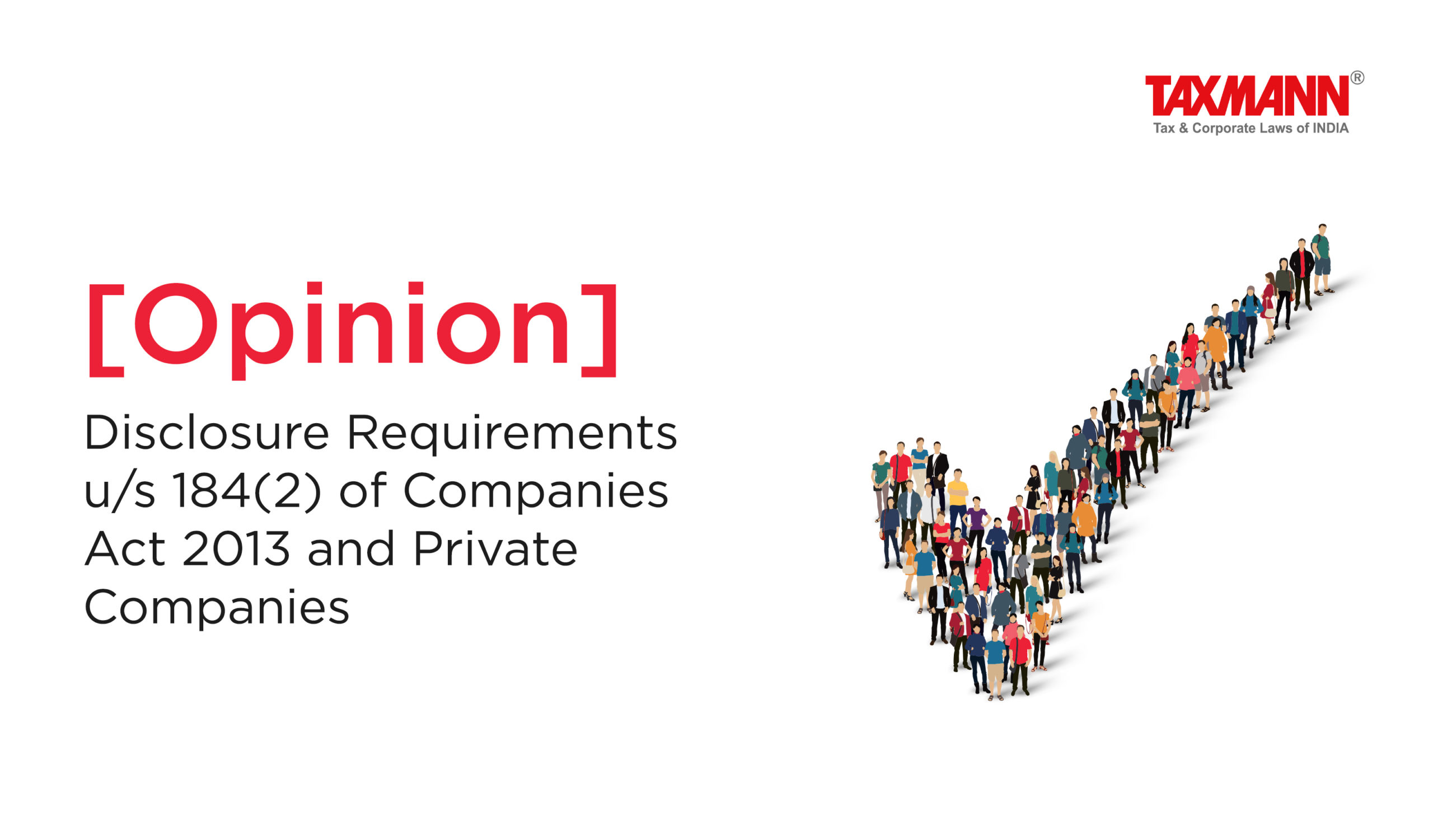[Opinion] Disclosure Requirements u/s 184(2) of Companies Act 2013 and Private Companies
- Blog|News|Company Law|
- 3 Min Read
- By Taxmann
- |
- Last Updated on 5 September, 2023

Dr K R Chandratre – [2023] 154 taxmann.com 38 (Article)
Statutory Framework
Subsection (2) of section 184 reads as follows:
“(2) Every director of a company who is in any way, whether directly or indirectly, concerned or interested in a contract or arrangement or proposed contract or arrangement entered into or to be entered into—
(a) with a body corporate in which such director or such director in association with any other director, holds more than two per cent shareholding of that body corporate, or is a promoter, manager, Chief Executive Officer of that body corporate; or
(b) with a firm or other entity in which, such director is a partner, owner or member, as the case may be, shall disclose the nature of his concern or interest at the meeting of the Board in which the contract or arrangement is discussed and shall not participate in such meeting:
Provided that where any director who is not so concerned or interested at the time of entering into such contract or arrangement, he shall, if he becomes concerned or interested after the contract or arrangement is entered into, disclose his concern or interest forthwith when he becomes concerned or interested or at the first meeting of the Board held after he becomes so concerned or interested.”
Object of Section 184
The statutory requirement under section 184 of the Companies Act 2013, as to the disclosure by company directors of their interests in contracts and arrangements to which the company is party, is founded on the principle that a director is precluded from dealing on behalf of the company with himself and from entering into engagements in which he has a personal interest conflicting, or which possibly may conflict, with the interest of those whom he is bound by fiduciary duty to protect.
Although section 184 does not prohibit such engagements or contracts and arrangements, it requires disclosure by the directors of their interests therein to their co-directors.
Section 184 has the object of bringing to the notice of the directors conflict of interest and duty of any of their colleagues on the Board. The expression ‘conflict of interest’ is defined as the circumstance of a public officeholder, business executive, or the like, whose personal interests might benefit from his or her official actions or influence; the circumstance of a person who finds that one of his or her activities, interests, etc., can be advanced only at the expense of another of them. The clearest exposition of this principle is to be found in an old English case, where it was stated:
“A corporate body can only act by agents and it is of course the duty of those agents so to act as best to promote the interests of the corporation whose affairs they are conducting. Such agents have duties to discharge of a fiduciary nature towards their principle. And it is a rule of universal application, that on one, having such duties to discharge, shall be allowed to enter into engagements in which he has, or can have, a personal interest conflicting, or which possibly may conflict, with the interest of those whom he is bound to protect. So strictly is this principle adhered to, that no question is allowed to be raised as to the fairness or unfairness of a contract so entered into. It obviously is, or may be, impossible to demonstrate how far in any particular case the terms of such a contract have been the best for the interest of cestuique trust, which it was possible to obtain. It may sometimes happen that the terms on which a trustee has dealt or attempted to deal with the estate or interests of those for whom he is a trustee, have been as good as could have been obtained from any other person, — they may even at the time have been better. But still so inflexible is the rule that no inquiry on that subject is permitted.”
Click Here To Read The Full Article
Disclaimer: The content/information published on the website is only for general information of the user and shall not be construed as legal advice. While the Taxmann has exercised reasonable efforts to ensure the veracity of information/content published, Taxmann shall be under no liability in any manner whatsoever for incorrect information, if any.

Taxmann Publications has a dedicated in-house Research & Editorial Team. This team consists of a team of Chartered Accountants, Company Secretaries, and Lawyers. This team works under the guidance and supervision of editor-in-chief Mr Rakesh Bhargava.
The Research and Editorial Team is responsible for developing reliable and accurate content for the readers. The team follows the six-sigma approach to achieve the benchmark of zero error in its publications and research platforms. The team ensures that the following publication guidelines are thoroughly followed while developing the content:
- The statutory material is obtained only from the authorized and reliable sources
- All the latest developments in the judicial and legislative fields are covered
- Prepare the analytical write-ups on current, controversial, and important issues to help the readers to understand the concept and its implications
- Every content published by Taxmann is complete, accurate and lucid
- All evidence-based statements are supported with proper reference to Section, Circular No., Notification No. or citations
- The golden rules of grammar, style and consistency are thoroughly followed
- Font and size that’s easy to read and remain consistent across all imprint and digital publications are applied



 CA | CS | CMA
CA | CS | CMA
